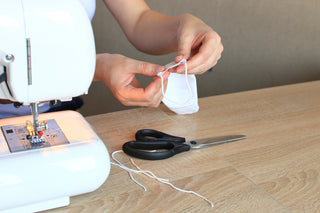With the rise of a dangerous worldwide pandemic, many people are looking for ways to avoid getting the virus. The N95 respirator masks have become one of the best ways to protect yourself from the potential spread of disease through airborne virus particles, but they have become a very rare commodity in today’s COVID-19 world. Despite manufacturer’s best efforts to keep up, it’s virtually impossible to find one of these masks at retail stores or online. Those at higher risk desperately need these masks. That applies if you are someone who:
- Is over the age of 60
- Has a compromised immune system
- Has underlying respiratory issues, such as asthma
- Works in a healthcare setting
- Has a job where you are still interacting with people on a daily basis, such as at a grocery store or gas station
- Is caring for a person who has contracted the COVID-19 virus
For those who need masks and are unable to find one, there is a lot of information out there on how to make your own from fabric. These are certainly better than nothing, but studies have shown that fabric masks are not nearly as effective as surgical masks (that study was comparing fabric masks to loose-fitting surgical masks, which are not nearly as effective as N95 masks).
So how can you make a more effective mask that will protect you from spreading or contracting the virus? You can make your own HEPA-filtering respirator mask with vacuum bags.
Benefits of DIY Respirator Masks
With the worldwide shortage of masks, DIY masks have become a popular choice for people who need more protection. Making your own masks can also provide you with a better fit because you can sew it to fit your face. This also leaves the very short supply of manufactured masks for healthcare workers, first responders, and others on the front lines who desperately need masks as they are caring for people with the COVID-19 virus.
Things You Should Know Before Making Your Own Mask
Before you start making a mask, there are a few things you should know
- HEPA filter vacuum bags are the best material you can use for DIY masks. Surgical masks filter about 97% of micron particles, while HEPA vacuum bags filter 95% of particles, far more than cotton t-shirts (74%), scarves (62%), or silk (58%).
- Vacuum bags can contain fiberglass threads you could breathe in, which would irritate your lungs. Cover the HEPA filter vacuum bag with cloth to avoid that.
Part 2 of this blog post has the detailed instructions for sewing the masks, as well as information about how to clean the masks safely if you need to reuse them. You can purchase HEPA vacuum bags at Vacuums 360 if you don’t have any, and get the protection you need to keep you and your family safe during these uncertain times.
Disclaimer: this blog is not medical advice and should not be used as a substitute for medical advice or advice from an epidemiologist. This is intended for informational purposes only.


